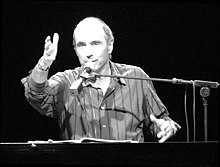Lluís Llach
| Lluís Llach | |
|---|---|

Lluís Llach performing at the Olympia in Paris
|
|
| Background information | |
| Born | 7 May 1948 |
| Genres | Songwriter |
| Instruments | Singing, Piano, Guitar |
| Years active | 1965–2007 |
| Website | www.lluisllach.cat |
Lluís Llach i Grande (Catalan pronunciation: [ʎuˈiz ˈʎak]) (born 7 May 1948 in Verges, Catalonia, Spain) is a composer and singer-songwriter.
He is one of the main representatives of Nova cançó (New Song), a movement of musicians, and singers who defied Francisco Franco's dictatorship by singing political songs in Catalan during a time where the language, and all other cultural manifestations of Catalan identity were prohibited. His famous song L'Estaca about a rotten stick about to fall was clear enough as an image of the regime. As many other singers, writers and politically involved artists, Llach left Spain and lived in voluntary exile in Paris until the death of the dictator.
Though partially dependent on arrangers, like Manel Camp or Carles Cases in his early works, Llach's songwriting has largely evolved from the more basic early compositions to a vastly more complex harmonic and melodic writing. Self-taught as a guitarist, Llach only strums simple chords on guitar. As a pianist, he shows a good knowledge of the European song tradition from Schubert to Hahn with touches of Satie (Nounou) and his local imitators like Mompou and Manuel Blancafort (A la taverna del mar). Llach has used salsa piano patterns (Terra) and jazzy whole-step block modulations (El jorn dels miserables) and progressions (Cançó d'amor a la llibertat). Some early songs depicted some inspiration from Baroque dances (Laura, Jo sé, Vinyes verdes vora el mar) and ostinato chord patterns (Non, Somniem). Among his influences as singer, Llach has recognized Mahalia Jackson and Jacques Brel.
His lyrics can range from the most traditionally romantic songs, to more complex, philosophical song-cycles and also to some more ironic, politically based compositions, with a more upbeat tempo. Sea and vitalistic attitude in face of death are two of his cherished topics. When he doesn't write the lyrics of his songs he puts music to a variety of poets, including Constantine P. Cavafy, Màrius Torres, Josep Maria de Segarra, Pere Quart and, perhaps more often than with any of the others, Miquel Martí i Pol.
...
Wikipedia
